Trauma-Informed Care: Analyzing Lisa's Case Study and Issues
VerifiedAdded on 2023/01/13
|12
|3116
|29
Essay
AI Summary
This essay provides an analysis of a case study involving a 26-year-old woman named Lisa, focusing on trauma-informed care principles. The essay identifies key issues contributing to Lisa's problematic substance abuse, including poor parent-child relationships, troubled relationships with her boyfriend, and low self-esteem. It explores the concept of trauma-informed care, emphasizing the importance of collaboration among healthcare professionals to address the multifaceted needs of individuals with trauma histories. The essay details the establishment of collaborative care, emphasizing the importance of creating a safe and trusting environment for the patient, active listening, and patient-centered communication. It also discusses the application of trauma-informed care principles in critical care settings, highlighting the need for healthcare providers to be aware of the potential impact of trauma on patients' emotional, physical, and mental health. The essay concludes by emphasizing the importance of self-reflection and avoiding judgmental attitudes when caring for trauma survivors, to facilitate effective communication and build a trustworthy relationship with the patient.

TRAUMA INFORMED CARE
[Document subtitle]
[DATE]
HP
[Company address]
[Document subtitle]
[DATE]
HP
[Company address]
Paraphrase This Document
Need a fresh take? Get an instant paraphrase of this document with our AI Paraphraser
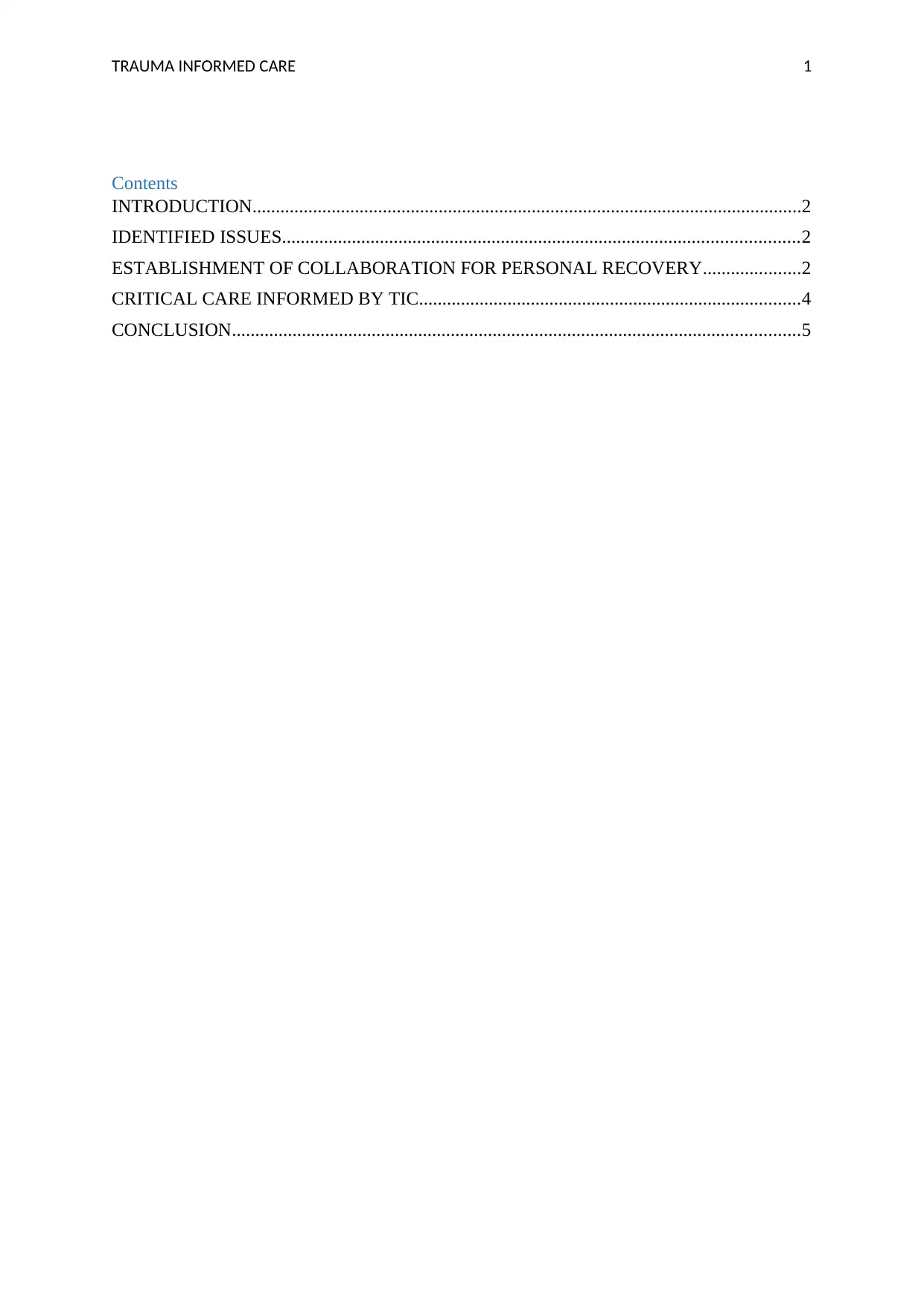
TRAUMA INFORMED CARE 1
Contents
INTRODUCTION......................................................................................................................2
IDENTIFIED ISSUES...............................................................................................................2
ESTABLISHMENT OF COLLABORATION FOR PERSONAL RECOVERY.....................2
CRITICAL CARE INFORMED BY TIC..................................................................................4
CONCLUSION..........................................................................................................................5
Contents
INTRODUCTION......................................................................................................................2
IDENTIFIED ISSUES...............................................................................................................2
ESTABLISHMENT OF COLLABORATION FOR PERSONAL RECOVERY.....................2
CRITICAL CARE INFORMED BY TIC..................................................................................4
CONCLUSION..........................................................................................................................5
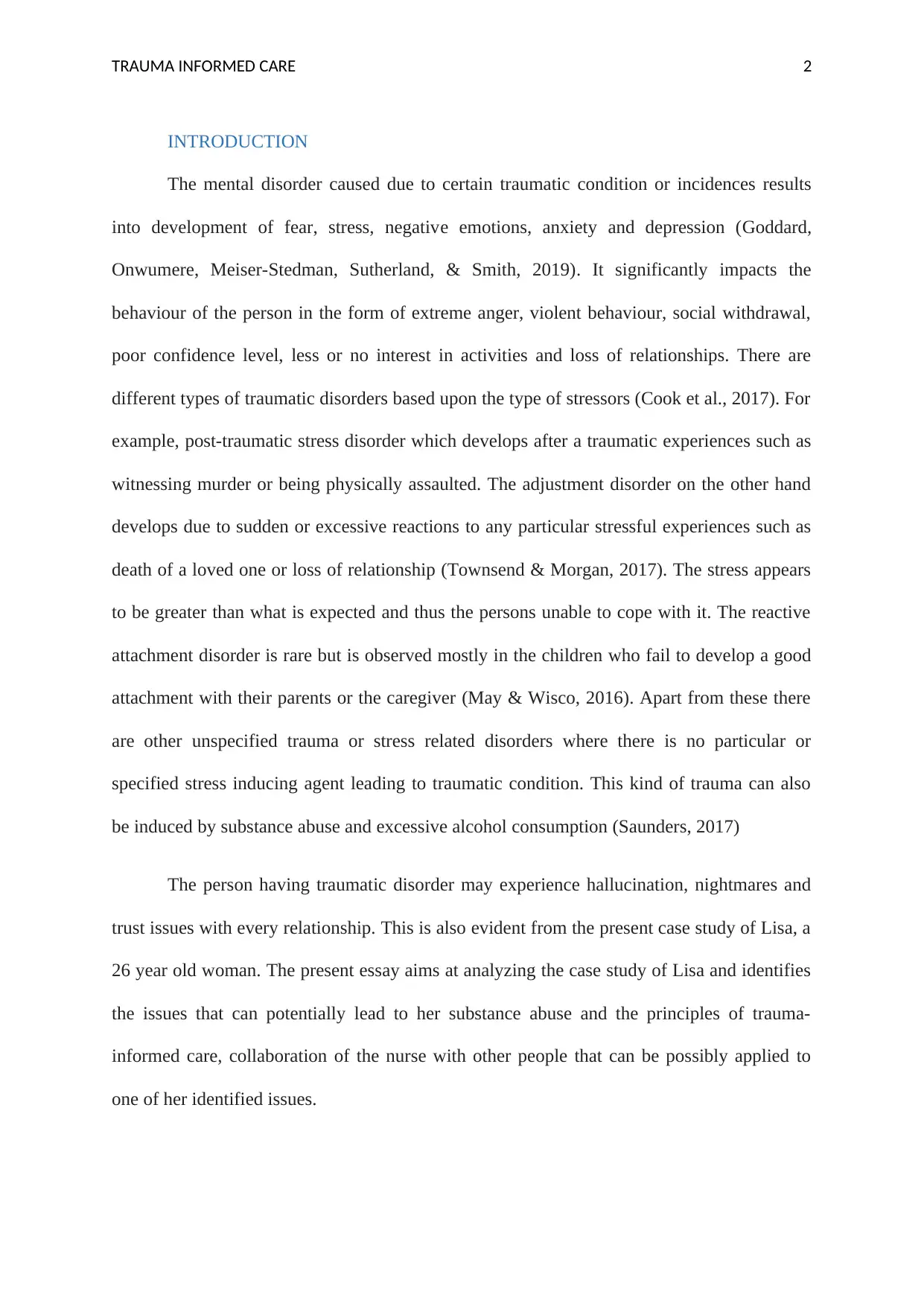
TRAUMA INFORMED CARE 2
INTRODUCTION
The mental disorder caused due to certain traumatic condition or incidences results
into development of fear, stress, negative emotions, anxiety and depression (Goddard,
Onwumere, Meiser-Stedman, Sutherland, & Smith, 2019). It significantly impacts the
behaviour of the person in the form of extreme anger, violent behaviour, social withdrawal,
poor confidence level, less or no interest in activities and loss of relationships. There are
different types of traumatic disorders based upon the type of stressors (Cook et al., 2017). For
example, post-traumatic stress disorder which develops after a traumatic experiences such as
witnessing murder or being physically assaulted. The adjustment disorder on the other hand
develops due to sudden or excessive reactions to any particular stressful experiences such as
death of a loved one or loss of relationship (Townsend & Morgan, 2017). The stress appears
to be greater than what is expected and thus the persons unable to cope with it. The reactive
attachment disorder is rare but is observed mostly in the children who fail to develop a good
attachment with their parents or the caregiver (May & Wisco, 2016). Apart from these there
are other unspecified trauma or stress related disorders where there is no particular or
specified stress inducing agent leading to traumatic condition. This kind of trauma can also
be induced by substance abuse and excessive alcohol consumption (Saunders, 2017)
The person having traumatic disorder may experience hallucination, nightmares and
trust issues with every relationship. This is also evident from the present case study of Lisa, a
26 year old woman. The present essay aims at analyzing the case study of Lisa and identifies
the issues that can potentially lead to her substance abuse and the principles of trauma-
informed care, collaboration of the nurse with other people that can be possibly applied to
one of her identified issues.
INTRODUCTION
The mental disorder caused due to certain traumatic condition or incidences results
into development of fear, stress, negative emotions, anxiety and depression (Goddard,
Onwumere, Meiser-Stedman, Sutherland, & Smith, 2019). It significantly impacts the
behaviour of the person in the form of extreme anger, violent behaviour, social withdrawal,
poor confidence level, less or no interest in activities and loss of relationships. There are
different types of traumatic disorders based upon the type of stressors (Cook et al., 2017). For
example, post-traumatic stress disorder which develops after a traumatic experiences such as
witnessing murder or being physically assaulted. The adjustment disorder on the other hand
develops due to sudden or excessive reactions to any particular stressful experiences such as
death of a loved one or loss of relationship (Townsend & Morgan, 2017). The stress appears
to be greater than what is expected and thus the persons unable to cope with it. The reactive
attachment disorder is rare but is observed mostly in the children who fail to develop a good
attachment with their parents or the caregiver (May & Wisco, 2016). Apart from these there
are other unspecified trauma or stress related disorders where there is no particular or
specified stress inducing agent leading to traumatic condition. This kind of trauma can also
be induced by substance abuse and excessive alcohol consumption (Saunders, 2017)
The person having traumatic disorder may experience hallucination, nightmares and
trust issues with every relationship. This is also evident from the present case study of Lisa, a
26 year old woman. The present essay aims at analyzing the case study of Lisa and identifies
the issues that can potentially lead to her substance abuse and the principles of trauma-
informed care, collaboration of the nurse with other people that can be possibly applied to
one of her identified issues.
⊘ This is a preview!⊘
Do you want full access?
Subscribe today to unlock all pages.

Trusted by 1+ million students worldwide
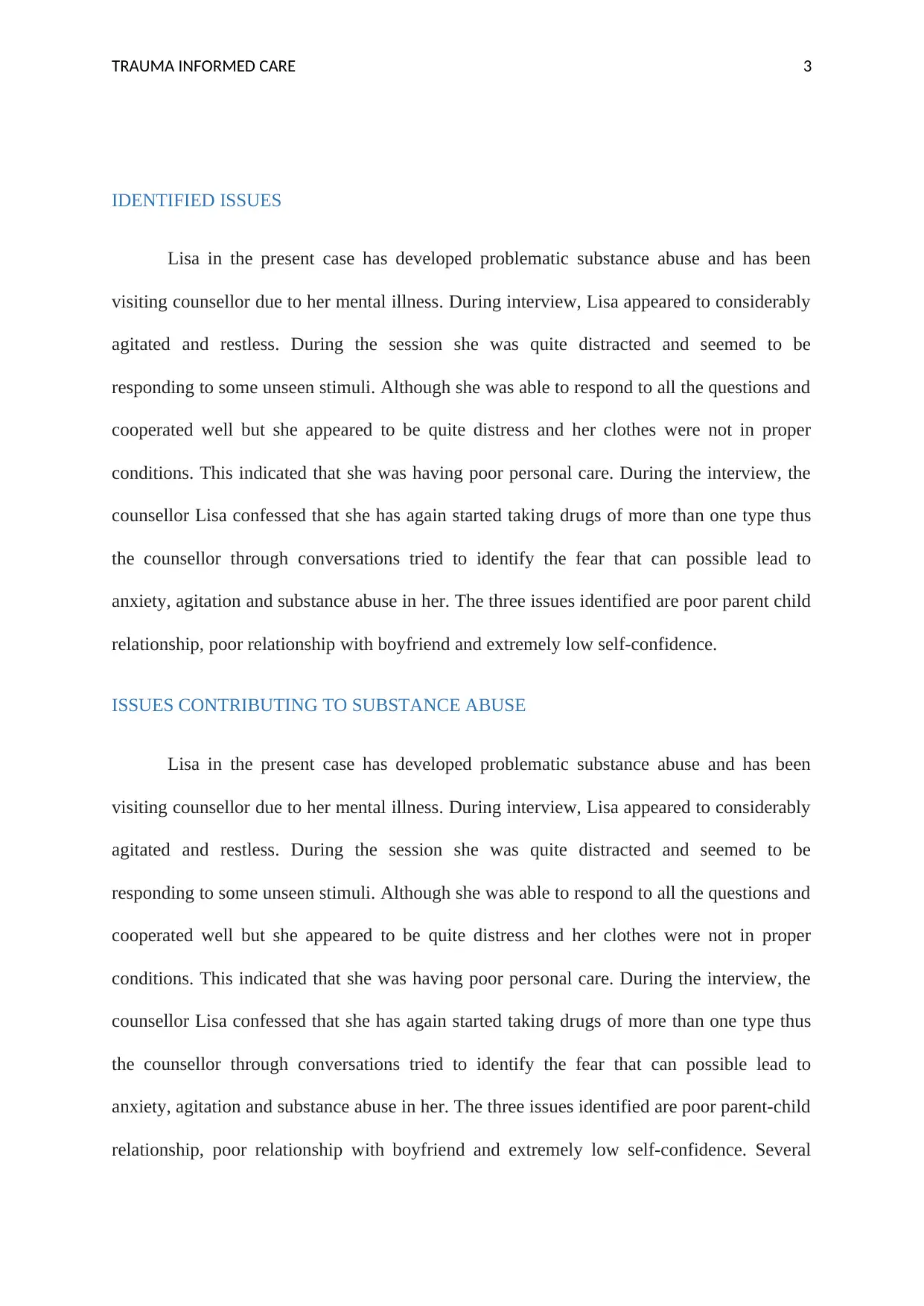
TRAUMA INFORMED CARE 3
IDENTIFIED ISSUES
Lisa in the present case has developed problematic substance abuse and has been
visiting counsellor due to her mental illness. During interview, Lisa appeared to considerably
agitated and restless. During the session she was quite distracted and seemed to be
responding to some unseen stimuli. Although she was able to respond to all the questions and
cooperated well but she appeared to be quite distress and her clothes were not in proper
conditions. This indicated that she was having poor personal care. During the interview, the
counsellor Lisa confessed that she has again started taking drugs of more than one type thus
the counsellor through conversations tried to identify the fear that can possible lead to
anxiety, agitation and substance abuse in her. The three issues identified are poor parent child
relationship, poor relationship with boyfriend and extremely low self-confidence.
ISSUES CONTRIBUTING TO SUBSTANCE ABUSE
Lisa in the present case has developed problematic substance abuse and has been
visiting counsellor due to her mental illness. During interview, Lisa appeared to considerably
agitated and restless. During the session she was quite distracted and seemed to be
responding to some unseen stimuli. Although she was able to respond to all the questions and
cooperated well but she appeared to be quite distress and her clothes were not in proper
conditions. This indicated that she was having poor personal care. During the interview, the
counsellor Lisa confessed that she has again started taking drugs of more than one type thus
the counsellor through conversations tried to identify the fear that can possible lead to
anxiety, agitation and substance abuse in her. The three issues identified are poor parent-child
relationship, poor relationship with boyfriend and extremely low self-confidence. Several
IDENTIFIED ISSUES
Lisa in the present case has developed problematic substance abuse and has been
visiting counsellor due to her mental illness. During interview, Lisa appeared to considerably
agitated and restless. During the session she was quite distracted and seemed to be
responding to some unseen stimuli. Although she was able to respond to all the questions and
cooperated well but she appeared to be quite distress and her clothes were not in proper
conditions. This indicated that she was having poor personal care. During the interview, the
counsellor Lisa confessed that she has again started taking drugs of more than one type thus
the counsellor through conversations tried to identify the fear that can possible lead to
anxiety, agitation and substance abuse in her. The three issues identified are poor parent child
relationship, poor relationship with boyfriend and extremely low self-confidence.
ISSUES CONTRIBUTING TO SUBSTANCE ABUSE
Lisa in the present case has developed problematic substance abuse and has been
visiting counsellor due to her mental illness. During interview, Lisa appeared to considerably
agitated and restless. During the session she was quite distracted and seemed to be
responding to some unseen stimuli. Although she was able to respond to all the questions and
cooperated well but she appeared to be quite distress and her clothes were not in proper
conditions. This indicated that she was having poor personal care. During the interview, the
counsellor Lisa confessed that she has again started taking drugs of more than one type thus
the counsellor through conversations tried to identify the fear that can possible lead to
anxiety, agitation and substance abuse in her. The three issues identified are poor parent-child
relationship, poor relationship with boyfriend and extremely low self-confidence. Several
Paraphrase This Document
Need a fresh take? Get an instant paraphrase of this document with our AI Paraphraser
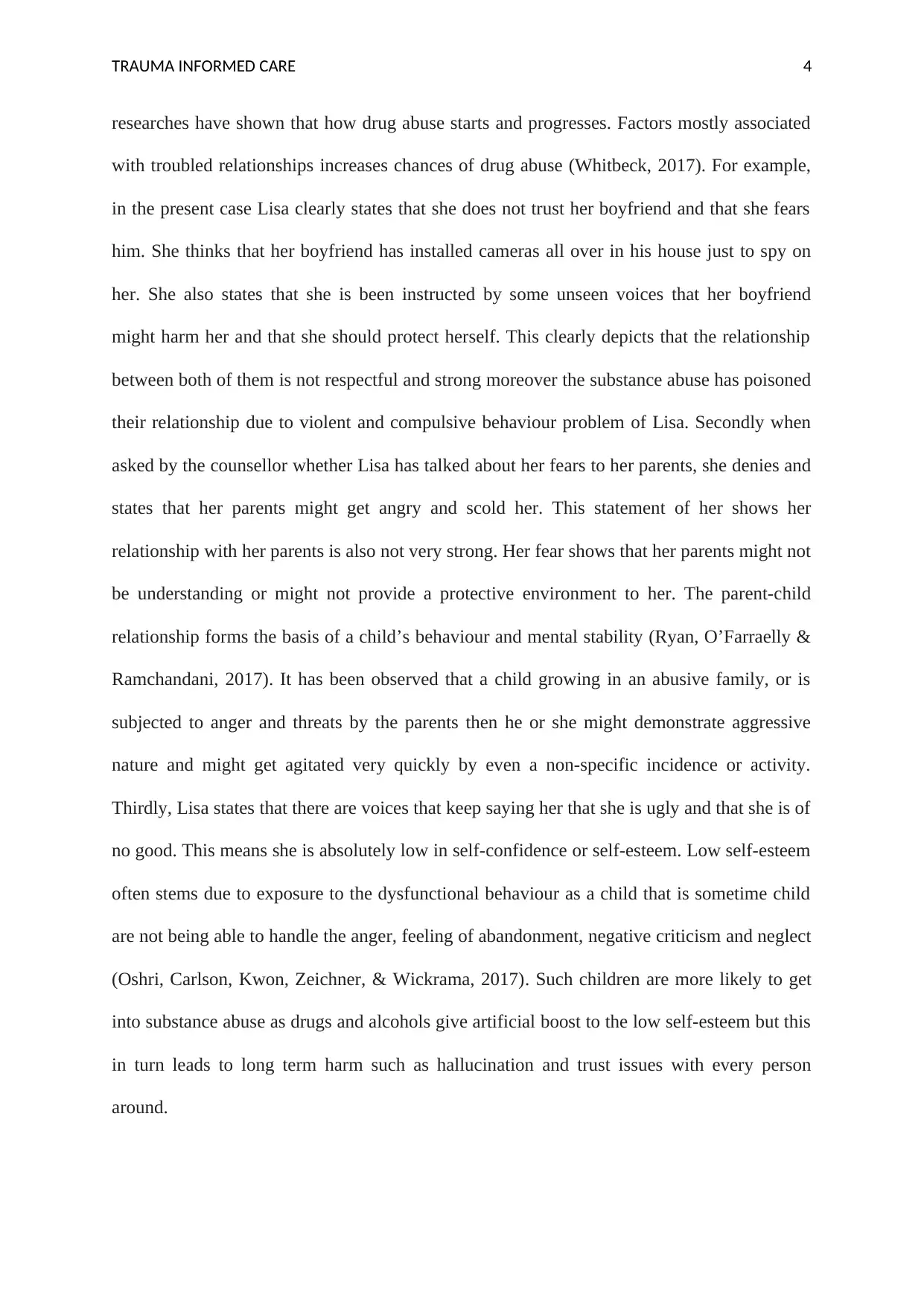
TRAUMA INFORMED CARE 4
researches have shown that how drug abuse starts and progresses. Factors mostly associated
with troubled relationships increases chances of drug abuse (Whitbeck, 2017). For example,
in the present case Lisa clearly states that she does not trust her boyfriend and that she fears
him. She thinks that her boyfriend has installed cameras all over in his house just to spy on
her. She also states that she is been instructed by some unseen voices that her boyfriend
might harm her and that she should protect herself. This clearly depicts that the relationship
between both of them is not respectful and strong moreover the substance abuse has poisoned
their relationship due to violent and compulsive behaviour problem of Lisa. Secondly when
asked by the counsellor whether Lisa has talked about her fears to her parents, she denies and
states that her parents might get angry and scold her. This statement of her shows her
relationship with her parents is also not very strong. Her fear shows that her parents might not
be understanding or might not provide a protective environment to her. The parent-child
relationship forms the basis of a child’s behaviour and mental stability (Ryan, O’Farraelly &
Ramchandani, 2017). It has been observed that a child growing in an abusive family, or is
subjected to anger and threats by the parents then he or she might demonstrate aggressive
nature and might get agitated very quickly by even a non-specific incidence or activity.
Thirdly, Lisa states that there are voices that keep saying her that she is ugly and that she is of
no good. This means she is absolutely low in self-confidence or self-esteem. Low self-esteem
often stems due to exposure to the dysfunctional behaviour as a child that is sometime child
are not being able to handle the anger, feeling of abandonment, negative criticism and neglect
(Oshri, Carlson, Kwon, Zeichner, & Wickrama, 2017). Such children are more likely to get
into substance abuse as drugs and alcohols give artificial boost to the low self-esteem but this
in turn leads to long term harm such as hallucination and trust issues with every person
around.
researches have shown that how drug abuse starts and progresses. Factors mostly associated
with troubled relationships increases chances of drug abuse (Whitbeck, 2017). For example,
in the present case Lisa clearly states that she does not trust her boyfriend and that she fears
him. She thinks that her boyfriend has installed cameras all over in his house just to spy on
her. She also states that she is been instructed by some unseen voices that her boyfriend
might harm her and that she should protect herself. This clearly depicts that the relationship
between both of them is not respectful and strong moreover the substance abuse has poisoned
their relationship due to violent and compulsive behaviour problem of Lisa. Secondly when
asked by the counsellor whether Lisa has talked about her fears to her parents, she denies and
states that her parents might get angry and scold her. This statement of her shows her
relationship with her parents is also not very strong. Her fear shows that her parents might not
be understanding or might not provide a protective environment to her. The parent-child
relationship forms the basis of a child’s behaviour and mental stability (Ryan, O’Farraelly &
Ramchandani, 2017). It has been observed that a child growing in an abusive family, or is
subjected to anger and threats by the parents then he or she might demonstrate aggressive
nature and might get agitated very quickly by even a non-specific incidence or activity.
Thirdly, Lisa states that there are voices that keep saying her that she is ugly and that she is of
no good. This means she is absolutely low in self-confidence or self-esteem. Low self-esteem
often stems due to exposure to the dysfunctional behaviour as a child that is sometime child
are not being able to handle the anger, feeling of abandonment, negative criticism and neglect
(Oshri, Carlson, Kwon, Zeichner, & Wickrama, 2017). Such children are more likely to get
into substance abuse as drugs and alcohols give artificial boost to the low self-esteem but this
in turn leads to long term harm such as hallucination and trust issues with every person
around.
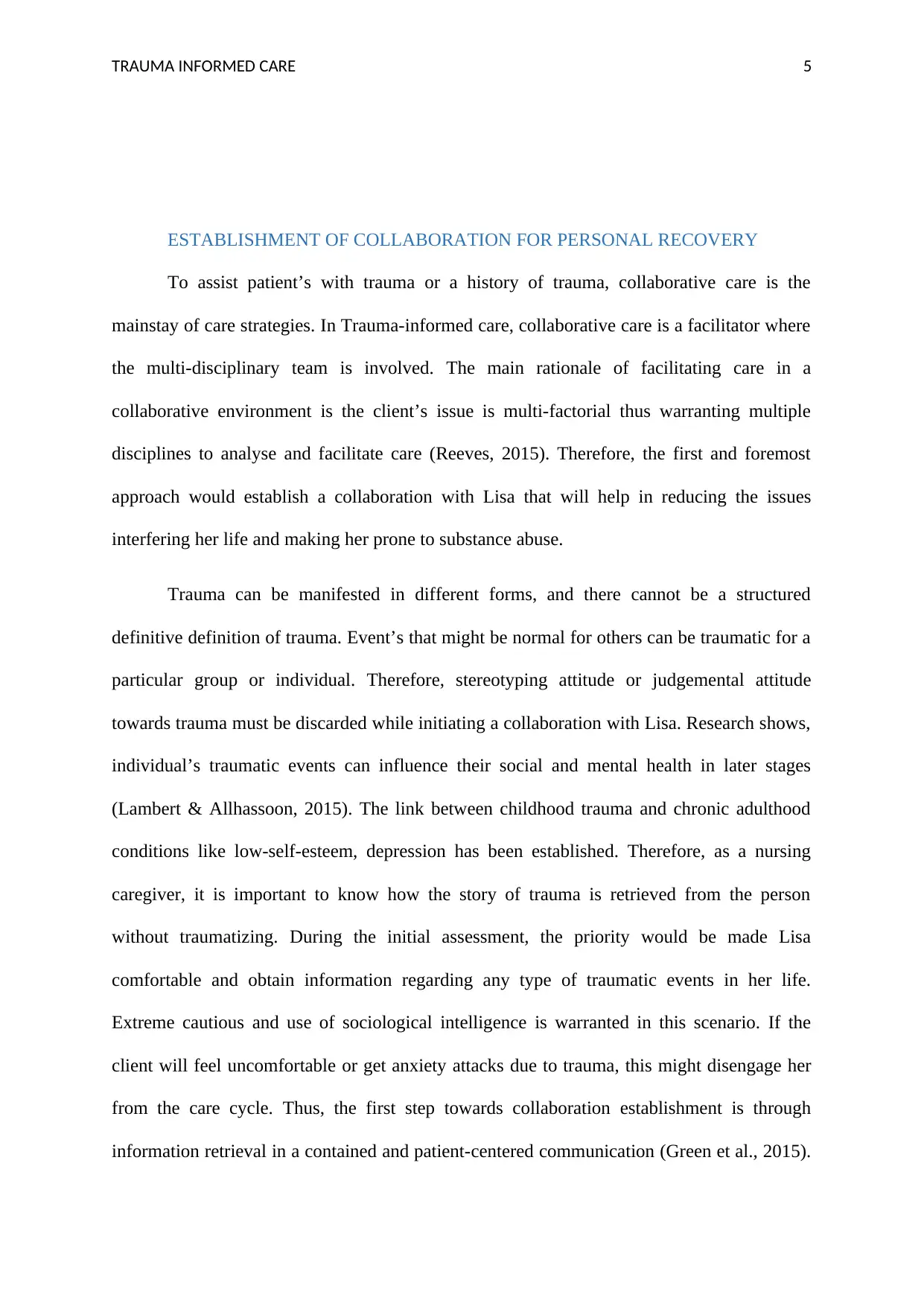
TRAUMA INFORMED CARE 5
ESTABLISHMENT OF COLLABORATION FOR PERSONAL RECOVERY
To assist patient’s with trauma or a history of trauma, collaborative care is the
mainstay of care strategies. In Trauma-informed care, collaborative care is a facilitator where
the multi-disciplinary team is involved. The main rationale of facilitating care in a
collaborative environment is the client’s issue is multi-factorial thus warranting multiple
disciplines to analyse and facilitate care (Reeves, 2015). Therefore, the first and foremost
approach would establish a collaboration with Lisa that will help in reducing the issues
interfering her life and making her prone to substance abuse.
Trauma can be manifested in different forms, and there cannot be a structured
definitive definition of trauma. Event’s that might be normal for others can be traumatic for a
particular group or individual. Therefore, stereotyping attitude or judgemental attitude
towards trauma must be discarded while initiating a collaboration with Lisa. Research shows,
individual’s traumatic events can influence their social and mental health in later stages
(Lambert & Allhassoon, 2015). The link between childhood trauma and chronic adulthood
conditions like low-self-esteem, depression has been established. Therefore, as a nursing
caregiver, it is important to know how the story of trauma is retrieved from the person
without traumatizing. During the initial assessment, the priority would be made Lisa
comfortable and obtain information regarding any type of traumatic events in her life.
Extreme cautious and use of sociological intelligence is warranted in this scenario. If the
client will feel uncomfortable or get anxiety attacks due to trauma, this might disengage her
from the care cycle. Thus, the first step towards collaboration establishment is through
information retrieval in a contained and patient-centered communication (Green et al., 2015).
ESTABLISHMENT OF COLLABORATION FOR PERSONAL RECOVERY
To assist patient’s with trauma or a history of trauma, collaborative care is the
mainstay of care strategies. In Trauma-informed care, collaborative care is a facilitator where
the multi-disciplinary team is involved. The main rationale of facilitating care in a
collaborative environment is the client’s issue is multi-factorial thus warranting multiple
disciplines to analyse and facilitate care (Reeves, 2015). Therefore, the first and foremost
approach would establish a collaboration with Lisa that will help in reducing the issues
interfering her life and making her prone to substance abuse.
Trauma can be manifested in different forms, and there cannot be a structured
definitive definition of trauma. Event’s that might be normal for others can be traumatic for a
particular group or individual. Therefore, stereotyping attitude or judgemental attitude
towards trauma must be discarded while initiating a collaboration with Lisa. Research shows,
individual’s traumatic events can influence their social and mental health in later stages
(Lambert & Allhassoon, 2015). The link between childhood trauma and chronic adulthood
conditions like low-self-esteem, depression has been established. Therefore, as a nursing
caregiver, it is important to know how the story of trauma is retrieved from the person
without traumatizing. During the initial assessment, the priority would be made Lisa
comfortable and obtain information regarding any type of traumatic events in her life.
Extreme cautious and use of sociological intelligence is warranted in this scenario. If the
client will feel uncomfortable or get anxiety attacks due to trauma, this might disengage her
from the care cycle. Thus, the first step towards collaboration establishment is through
information retrieval in a contained and patient-centered communication (Green et al., 2015).
⊘ This is a preview!⊘
Do you want full access?
Subscribe today to unlock all pages.

Trusted by 1+ million students worldwide
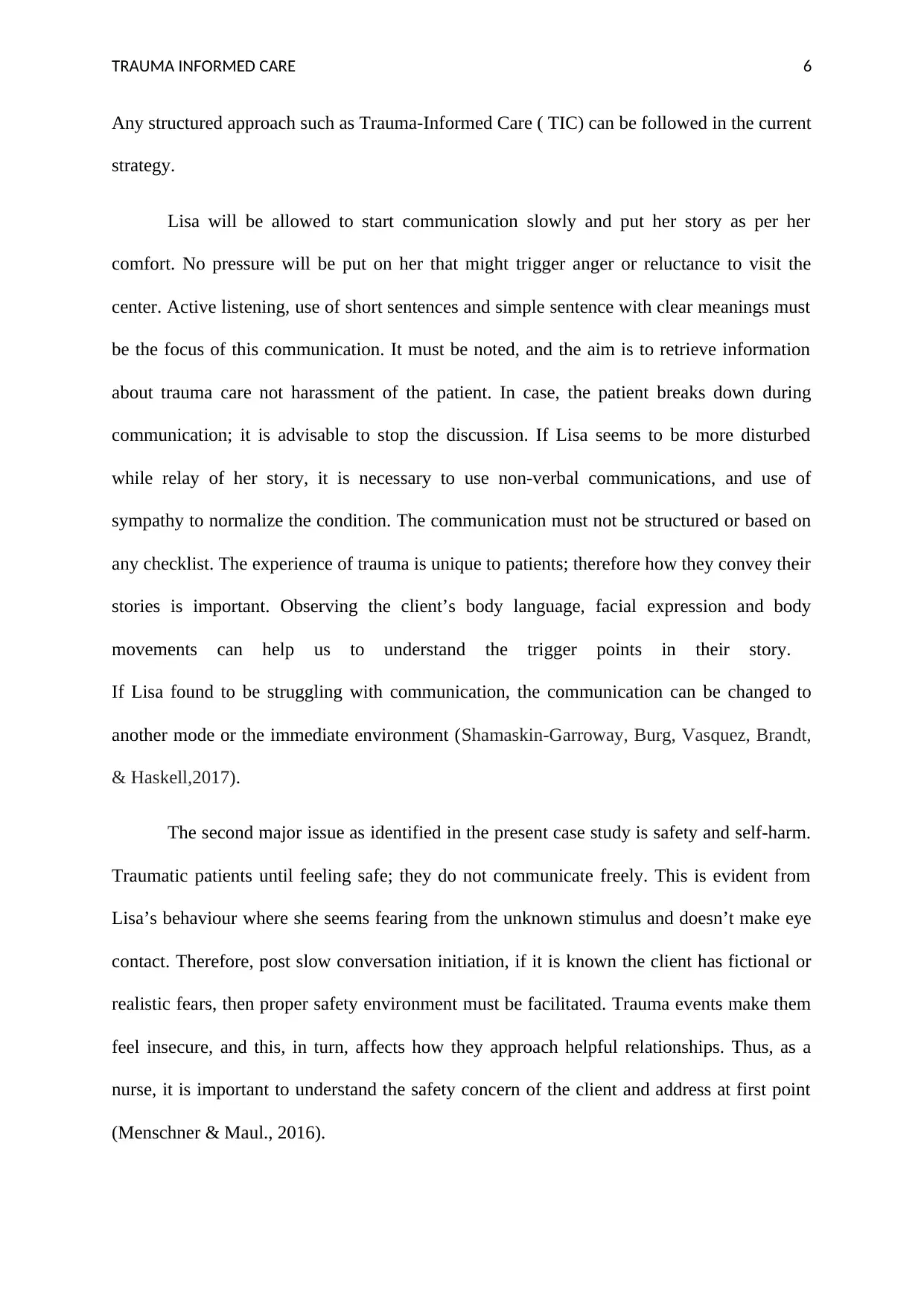
TRAUMA INFORMED CARE 6
Any structured approach such as Trauma-Informed Care ( TIC) can be followed in the current
strategy.
Lisa will be allowed to start communication slowly and put her story as per her
comfort. No pressure will be put on her that might trigger anger or reluctance to visit the
center. Active listening, use of short sentences and simple sentence with clear meanings must
be the focus of this communication. It must be noted, and the aim is to retrieve information
about trauma care not harassment of the patient. In case, the patient breaks down during
communication; it is advisable to stop the discussion. If Lisa seems to be more disturbed
while relay of her story, it is necessary to use non-verbal communications, and use of
sympathy to normalize the condition. The communication must not be structured or based on
any checklist. The experience of trauma is unique to patients; therefore how they convey their
stories is important. Observing the client’s body language, facial expression and body
movements can help us to understand the trigger points in their story.
If Lisa found to be struggling with communication, the communication can be changed to
another mode or the immediate environment (Shamaskin-Garroway, Burg, Vasquez, Brandt,
& Haskell,2017).
The second major issue as identified in the present case study is safety and self-harm.
Traumatic patients until feeling safe; they do not communicate freely. This is evident from
Lisa’s behaviour where she seems fearing from the unknown stimulus and doesn’t make eye
contact. Therefore, post slow conversation initiation, if it is known the client has fictional or
realistic fears, then proper safety environment must be facilitated. Trauma events make them
feel insecure, and this, in turn, affects how they approach helpful relationships. Thus, as a
nurse, it is important to understand the safety concern of the client and address at first point
(Menschner & Maul., 2016).
Any structured approach such as Trauma-Informed Care ( TIC) can be followed in the current
strategy.
Lisa will be allowed to start communication slowly and put her story as per her
comfort. No pressure will be put on her that might trigger anger or reluctance to visit the
center. Active listening, use of short sentences and simple sentence with clear meanings must
be the focus of this communication. It must be noted, and the aim is to retrieve information
about trauma care not harassment of the patient. In case, the patient breaks down during
communication; it is advisable to stop the discussion. If Lisa seems to be more disturbed
while relay of her story, it is necessary to use non-verbal communications, and use of
sympathy to normalize the condition. The communication must not be structured or based on
any checklist. The experience of trauma is unique to patients; therefore how they convey their
stories is important. Observing the client’s body language, facial expression and body
movements can help us to understand the trigger points in their story.
If Lisa found to be struggling with communication, the communication can be changed to
another mode or the immediate environment (Shamaskin-Garroway, Burg, Vasquez, Brandt,
& Haskell,2017).
The second major issue as identified in the present case study is safety and self-harm.
Traumatic patients until feeling safe; they do not communicate freely. This is evident from
Lisa’s behaviour where she seems fearing from the unknown stimulus and doesn’t make eye
contact. Therefore, post slow conversation initiation, if it is known the client has fictional or
realistic fears, then proper safety environment must be facilitated. Trauma events make them
feel insecure, and this, in turn, affects how they approach helpful relationships. Thus, as a
nurse, it is important to understand the safety concern of the client and address at first point
(Menschner & Maul., 2016).
Paraphrase This Document
Need a fresh take? Get an instant paraphrase of this document with our AI Paraphraser
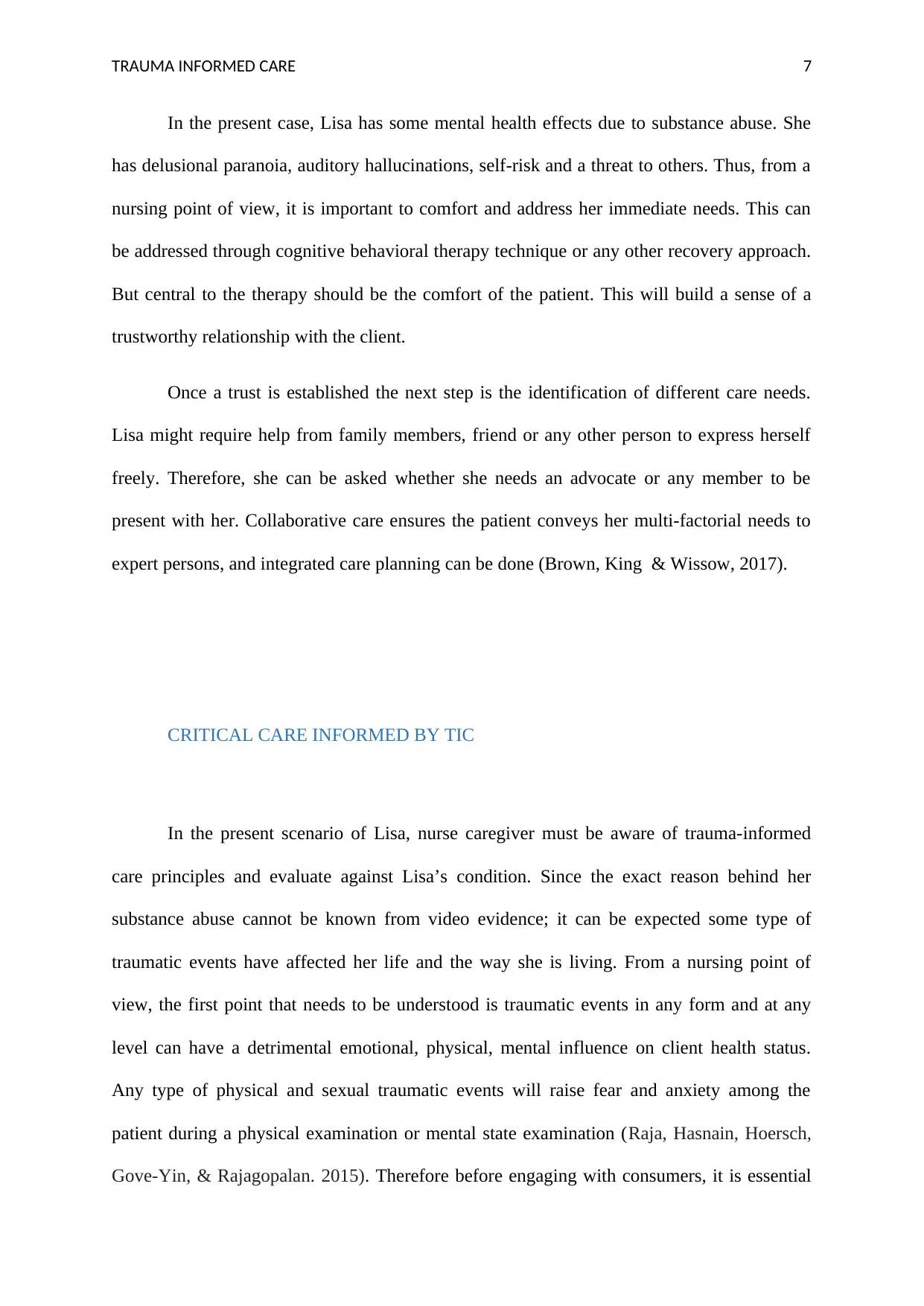
TRAUMA INFORMED CARE 7
In the present case, Lisa has some mental health effects due to substance abuse. She
has delusional paranoia, auditory hallucinations, self-risk and a threat to others. Thus, from a
nursing point of view, it is important to comfort and address her immediate needs. This can
be addressed through cognitive behavioral therapy technique or any other recovery approach.
But central to the therapy should be the comfort of the patient. This will build a sense of a
trustworthy relationship with the client.
Once a trust is established the next step is the identification of different care needs.
Lisa might require help from family members, friend or any other person to express herself
freely. Therefore, she can be asked whether she needs an advocate or any member to be
present with her. Collaborative care ensures the patient conveys her multi-factorial needs to
expert persons, and integrated care planning can be done (Brown, King & Wissow, 2017).
CRITICAL CARE INFORMED BY TIC
In the present scenario of Lisa, nurse caregiver must be aware of trauma-informed
care principles and evaluate against Lisa’s condition. Since the exact reason behind her
substance abuse cannot be known from video evidence; it can be expected some type of
traumatic events have affected her life and the way she is living. From a nursing point of
view, the first point that needs to be understood is traumatic events in any form and at any
level can have a detrimental emotional, physical, mental influence on client health status.
Any type of physical and sexual traumatic events will raise fear and anxiety among the
patient during a physical examination or mental state examination (Raja, Hasnain, Hoersch,
Gove-Yin, & Rajagopalan. 2015). Therefore before engaging with consumers, it is essential
In the present case, Lisa has some mental health effects due to substance abuse. She
has delusional paranoia, auditory hallucinations, self-risk and a threat to others. Thus, from a
nursing point of view, it is important to comfort and address her immediate needs. This can
be addressed through cognitive behavioral therapy technique or any other recovery approach.
But central to the therapy should be the comfort of the patient. This will build a sense of a
trustworthy relationship with the client.
Once a trust is established the next step is the identification of different care needs.
Lisa might require help from family members, friend or any other person to express herself
freely. Therefore, she can be asked whether she needs an advocate or any member to be
present with her. Collaborative care ensures the patient conveys her multi-factorial needs to
expert persons, and integrated care planning can be done (Brown, King & Wissow, 2017).
CRITICAL CARE INFORMED BY TIC
In the present scenario of Lisa, nurse caregiver must be aware of trauma-informed
care principles and evaluate against Lisa’s condition. Since the exact reason behind her
substance abuse cannot be known from video evidence; it can be expected some type of
traumatic events have affected her life and the way she is living. From a nursing point of
view, the first point that needs to be understood is traumatic events in any form and at any
level can have a detrimental emotional, physical, mental influence on client health status.
Any type of physical and sexual traumatic events will raise fear and anxiety among the
patient during a physical examination or mental state examination (Raja, Hasnain, Hoersch,
Gove-Yin, & Rajagopalan. 2015). Therefore before engaging with consumers, it is essential
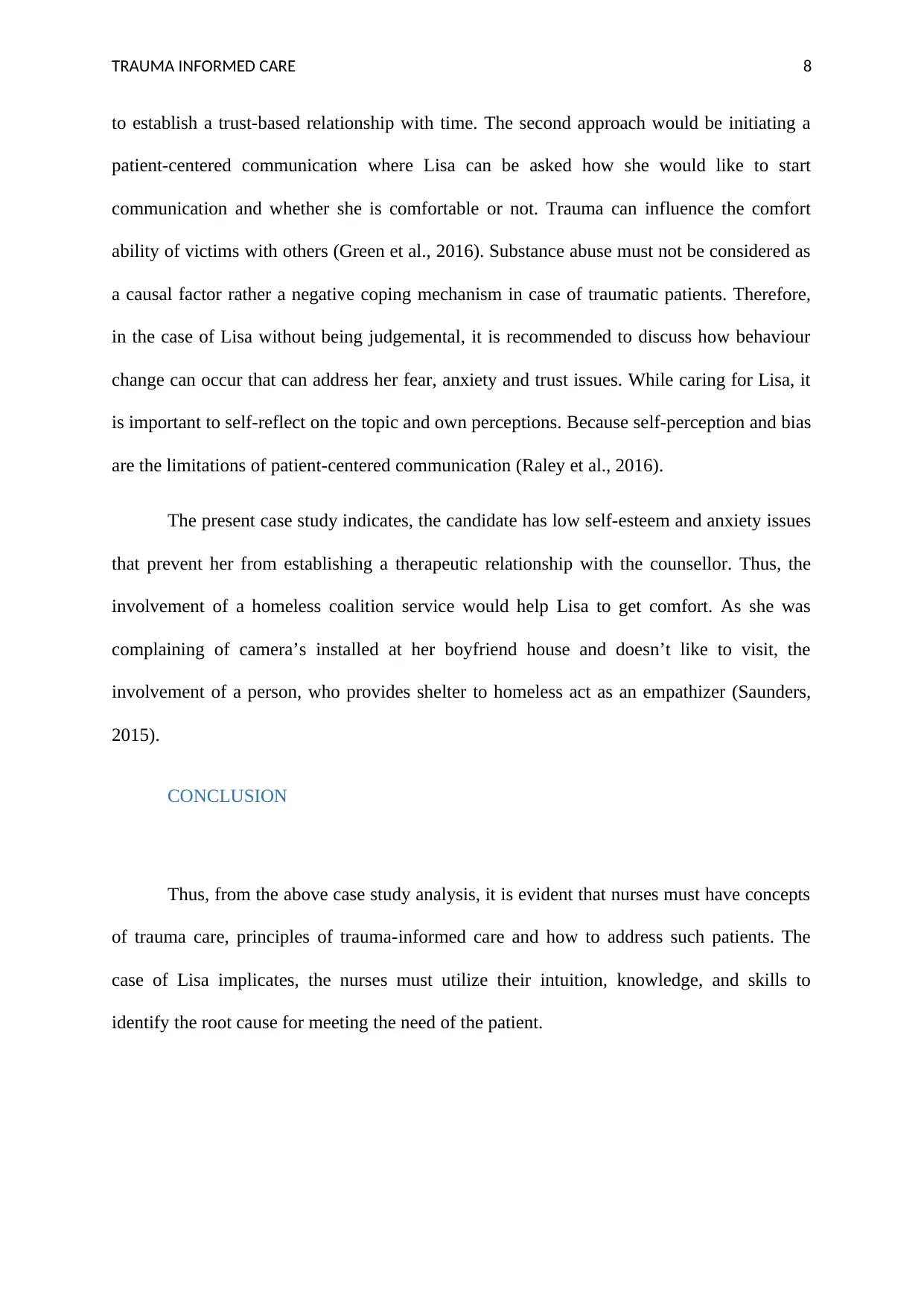
TRAUMA INFORMED CARE 8
to establish a trust-based relationship with time. The second approach would be initiating a
patient-centered communication where Lisa can be asked how she would like to start
communication and whether she is comfortable or not. Trauma can influence the comfort
ability of victims with others (Green et al., 2016). Substance abuse must not be considered as
a causal factor rather a negative coping mechanism in case of traumatic patients. Therefore,
in the case of Lisa without being judgemental, it is recommended to discuss how behaviour
change can occur that can address her fear, anxiety and trust issues. While caring for Lisa, it
is important to self-reflect on the topic and own perceptions. Because self-perception and bias
are the limitations of patient-centered communication (Raley et al., 2016).
The present case study indicates, the candidate has low self-esteem and anxiety issues
that prevent her from establishing a therapeutic relationship with the counsellor. Thus, the
involvement of a homeless coalition service would help Lisa to get comfort. As she was
complaining of camera’s installed at her boyfriend house and doesn’t like to visit, the
involvement of a person, who provides shelter to homeless act as an empathizer (Saunders,
2015).
CONCLUSION
Thus, from the above case study analysis, it is evident that nurses must have concepts
of trauma care, principles of trauma-informed care and how to address such patients. The
case of Lisa implicates, the nurses must utilize their intuition, knowledge, and skills to
identify the root cause for meeting the need of the patient.
to establish a trust-based relationship with time. The second approach would be initiating a
patient-centered communication where Lisa can be asked how she would like to start
communication and whether she is comfortable or not. Trauma can influence the comfort
ability of victims with others (Green et al., 2016). Substance abuse must not be considered as
a causal factor rather a negative coping mechanism in case of traumatic patients. Therefore,
in the case of Lisa without being judgemental, it is recommended to discuss how behaviour
change can occur that can address her fear, anxiety and trust issues. While caring for Lisa, it
is important to self-reflect on the topic and own perceptions. Because self-perception and bias
are the limitations of patient-centered communication (Raley et al., 2016).
The present case study indicates, the candidate has low self-esteem and anxiety issues
that prevent her from establishing a therapeutic relationship with the counsellor. Thus, the
involvement of a homeless coalition service would help Lisa to get comfort. As she was
complaining of camera’s installed at her boyfriend house and doesn’t like to visit, the
involvement of a person, who provides shelter to homeless act as an empathizer (Saunders,
2015).
CONCLUSION
Thus, from the above case study analysis, it is evident that nurses must have concepts
of trauma care, principles of trauma-informed care and how to address such patients. The
case of Lisa implicates, the nurses must utilize their intuition, knowledge, and skills to
identify the root cause for meeting the need of the patient.
⊘ This is a preview!⊘
Do you want full access?
Subscribe today to unlock all pages.

Trusted by 1+ million students worldwide
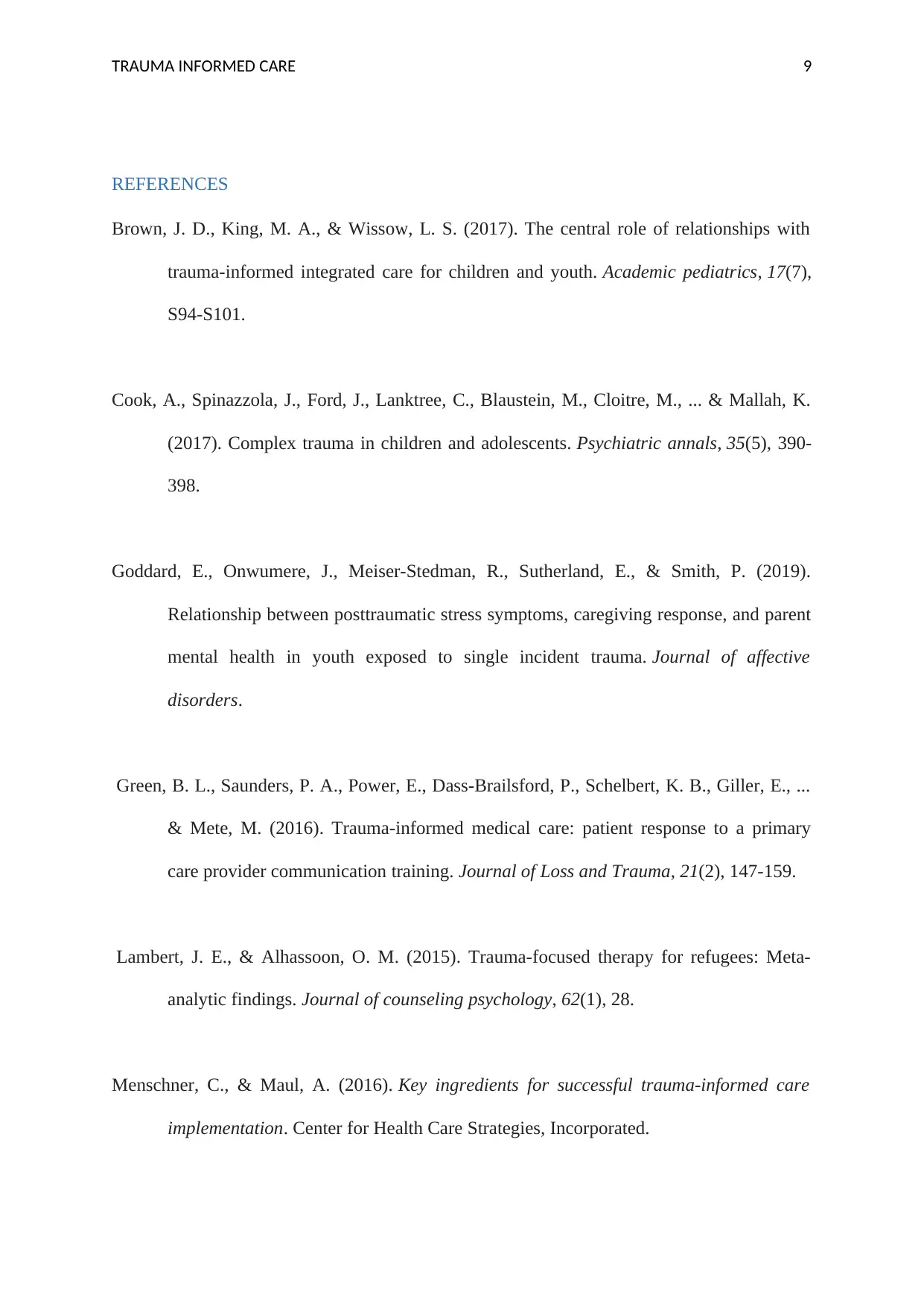
TRAUMA INFORMED CARE 9
REFERENCES
Brown, J. D., King, M. A., & Wissow, L. S. (2017). The central role of relationships with
trauma-informed integrated care for children and youth. Academic pediatrics, 17(7),
S94-S101.
Cook, A., Spinazzola, J., Ford, J., Lanktree, C., Blaustein, M., Cloitre, M., ... & Mallah, K.
(2017). Complex trauma in children and adolescents. Psychiatric annals, 35(5), 390-
398.
Goddard, E., Onwumere, J., Meiser-Stedman, R., Sutherland, E., & Smith, P. (2019).
Relationship between posttraumatic stress symptoms, caregiving response, and parent
mental health in youth exposed to single incident trauma. Journal of affective
disorders.
Green, B. L., Saunders, P. A., Power, E., Dass-Brailsford, P., Schelbert, K. B., Giller, E., ...
& Mete, M. (2016). Trauma-informed medical care: patient response to a primary
care provider communication training. Journal of Loss and Trauma, 21(2), 147-159.
Lambert, J. E., & Alhassoon, O. M. (2015). Trauma-focused therapy for refugees: Meta-
analytic findings. Journal of counseling psychology, 62(1), 28.
Menschner, C., & Maul, A. (2016). Key ingredients for successful trauma-informed care
implementation. Center for Health Care Strategies, Incorporated.
REFERENCES
Brown, J. D., King, M. A., & Wissow, L. S. (2017). The central role of relationships with
trauma-informed integrated care for children and youth. Academic pediatrics, 17(7),
S94-S101.
Cook, A., Spinazzola, J., Ford, J., Lanktree, C., Blaustein, M., Cloitre, M., ... & Mallah, K.
(2017). Complex trauma in children and adolescents. Psychiatric annals, 35(5), 390-
398.
Goddard, E., Onwumere, J., Meiser-Stedman, R., Sutherland, E., & Smith, P. (2019).
Relationship between posttraumatic stress symptoms, caregiving response, and parent
mental health in youth exposed to single incident trauma. Journal of affective
disorders.
Green, B. L., Saunders, P. A., Power, E., Dass-Brailsford, P., Schelbert, K. B., Giller, E., ...
& Mete, M. (2016). Trauma-informed medical care: patient response to a primary
care provider communication training. Journal of Loss and Trauma, 21(2), 147-159.
Lambert, J. E., & Alhassoon, O. M. (2015). Trauma-focused therapy for refugees: Meta-
analytic findings. Journal of counseling psychology, 62(1), 28.
Menschner, C., & Maul, A. (2016). Key ingredients for successful trauma-informed care
implementation. Center for Health Care Strategies, Incorporated.
Paraphrase This Document
Need a fresh take? Get an instant paraphrase of this document with our AI Paraphraser
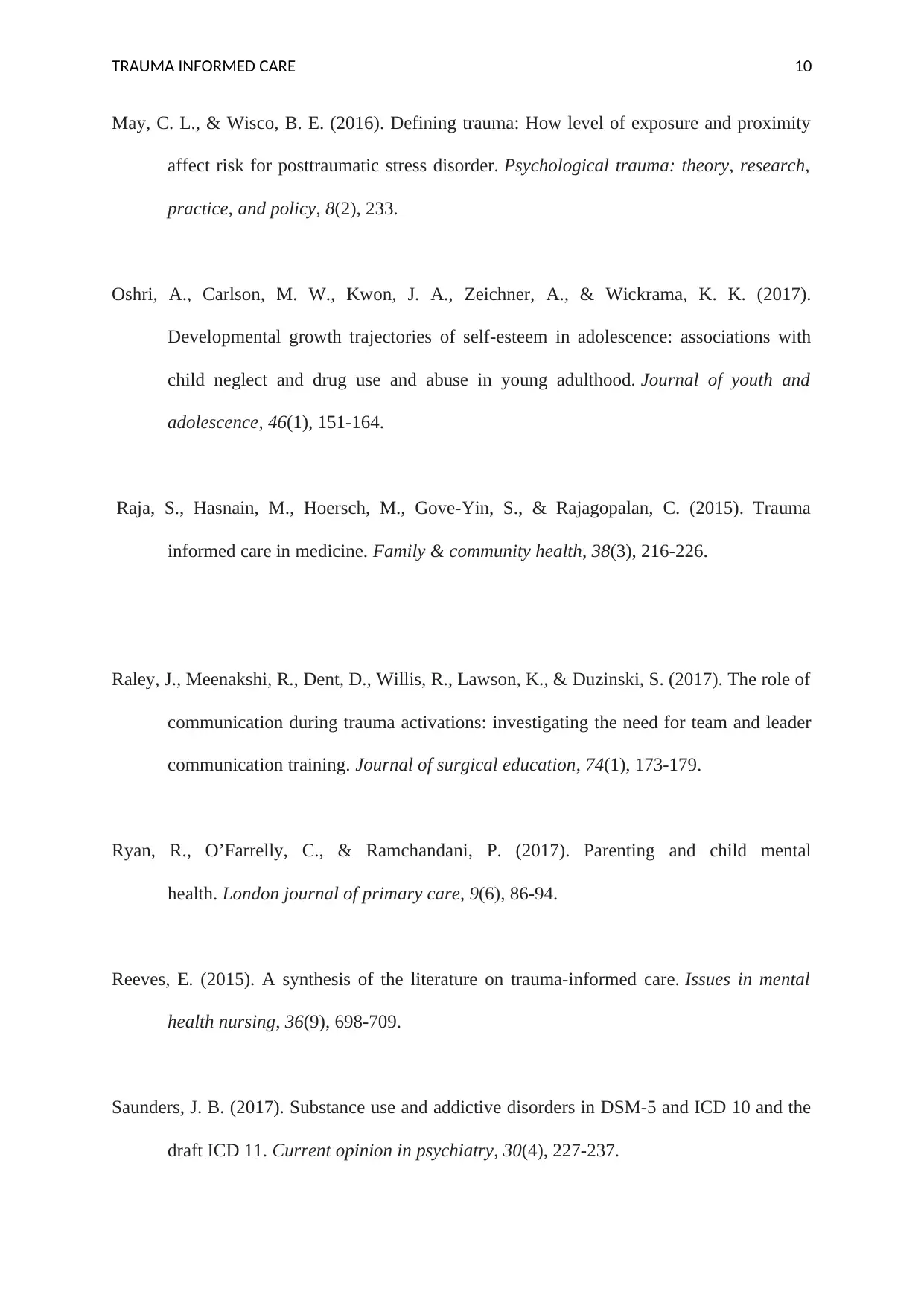
TRAUMA INFORMED CARE 10
May, C. L., & Wisco, B. E. (2016). Defining trauma: How level of exposure and proximity
affect risk for posttraumatic stress disorder. Psychological trauma: theory, research,
practice, and policy, 8(2), 233.
Oshri, A., Carlson, M. W., Kwon, J. A., Zeichner, A., & Wickrama, K. K. (2017).
Developmental growth trajectories of self-esteem in adolescence: associations with
child neglect and drug use and abuse in young adulthood. Journal of youth and
adolescence, 46(1), 151-164.
Raja, S., Hasnain, M., Hoersch, M., Gove-Yin, S., & Rajagopalan, C. (2015). Trauma
informed care in medicine. Family & community health, 38(3), 216-226.
Raley, J., Meenakshi, R., Dent, D., Willis, R., Lawson, K., & Duzinski, S. (2017). The role of
communication during trauma activations: investigating the need for team and leader
communication training. Journal of surgical education, 74(1), 173-179.
Ryan, R., O’Farrelly, C., & Ramchandani, P. (2017). Parenting and child mental
health. London journal of primary care, 9(6), 86-94.
Reeves, E. (2015). A synthesis of the literature on trauma-informed care. Issues in mental
health nursing, 36(9), 698-709.
Saunders, J. B. (2017). Substance use and addictive disorders in DSM-5 and ICD 10 and the
draft ICD 11. Current opinion in psychiatry, 30(4), 227-237.
May, C. L., & Wisco, B. E. (2016). Defining trauma: How level of exposure and proximity
affect risk for posttraumatic stress disorder. Psychological trauma: theory, research,
practice, and policy, 8(2), 233.
Oshri, A., Carlson, M. W., Kwon, J. A., Zeichner, A., & Wickrama, K. K. (2017).
Developmental growth trajectories of self-esteem in adolescence: associations with
child neglect and drug use and abuse in young adulthood. Journal of youth and
adolescence, 46(1), 151-164.
Raja, S., Hasnain, M., Hoersch, M., Gove-Yin, S., & Rajagopalan, C. (2015). Trauma
informed care in medicine. Family & community health, 38(3), 216-226.
Raley, J., Meenakshi, R., Dent, D., Willis, R., Lawson, K., & Duzinski, S. (2017). The role of
communication during trauma activations: investigating the need for team and leader
communication training. Journal of surgical education, 74(1), 173-179.
Ryan, R., O’Farrelly, C., & Ramchandani, P. (2017). Parenting and child mental
health. London journal of primary care, 9(6), 86-94.
Reeves, E. (2015). A synthesis of the literature on trauma-informed care. Issues in mental
health nursing, 36(9), 698-709.
Saunders, J. B. (2017). Substance use and addictive disorders in DSM-5 and ICD 10 and the
draft ICD 11. Current opinion in psychiatry, 30(4), 227-237.
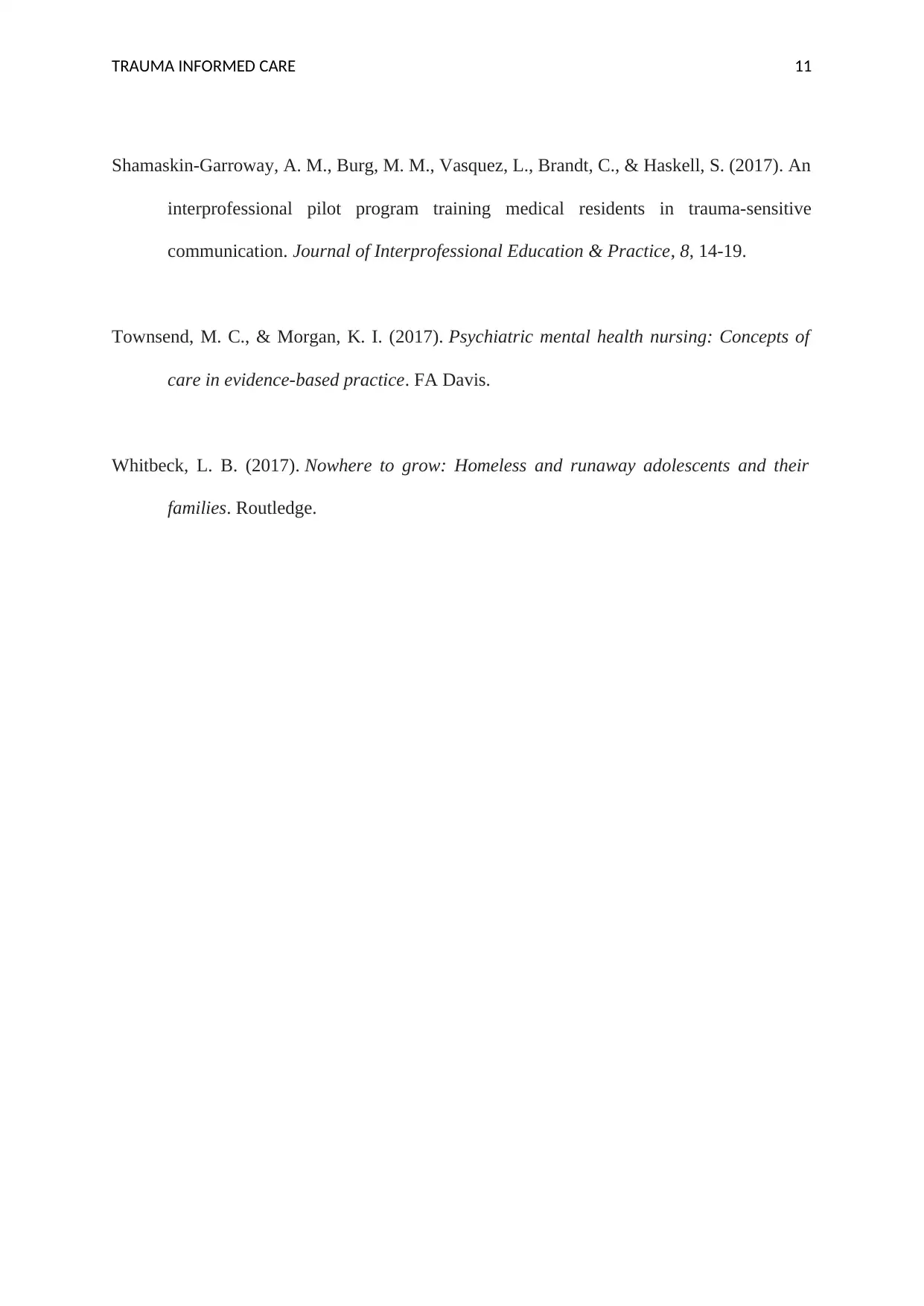
TRAUMA INFORMED CARE 11
Shamaskin-Garroway, A. M., Burg, M. M., Vasquez, L., Brandt, C., & Haskell, S. (2017). An
interprofessional pilot program training medical residents in trauma-sensitive
communication. Journal of Interprofessional Education & Practice, 8, 14-19.
Townsend, M. C., & Morgan, K. I. (2017). Psychiatric mental health nursing: Concepts of
care in evidence-based practice. FA Davis.
Whitbeck, L. B. (2017). Nowhere to grow: Homeless and runaway adolescents and their
families. Routledge.
Shamaskin-Garroway, A. M., Burg, M. M., Vasquez, L., Brandt, C., & Haskell, S. (2017). An
interprofessional pilot program training medical residents in trauma-sensitive
communication. Journal of Interprofessional Education & Practice, 8, 14-19.
Townsend, M. C., & Morgan, K. I. (2017). Psychiatric mental health nursing: Concepts of
care in evidence-based practice. FA Davis.
Whitbeck, L. B. (2017). Nowhere to grow: Homeless and runaway adolescents and their
families. Routledge.
⊘ This is a preview!⊘
Do you want full access?
Subscribe today to unlock all pages.

Trusted by 1+ million students worldwide
1 out of 12
Related Documents
Your All-in-One AI-Powered Toolkit for Academic Success.
+13062052269
info@desklib.com
Available 24*7 on WhatsApp / Email
![[object Object]](/_next/static/media/star-bottom.7253800d.svg)
Unlock your academic potential
Copyright © 2020–2026 A2Z Services. All Rights Reserved. Developed and managed by ZUCOL.





